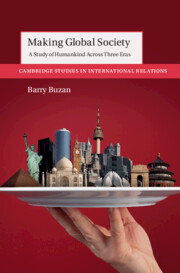Book contents
- Making Global Society
- Cambridge Studies in International Relations
- Making Global Society
- Copyright page
- Dedication
- Contents
- Tables
- Preface
- Acknowledgements
- 1 Introduction
- Part I Laying the Foundations for Global Society
- Part II The Transition to Modernity and the Making of Global Society
- Part III Deep Pluralism
- Introduction to Part III
- 7 Material Conditions
- 8 Social Structure
- Conclusions to Part III
- Part IV Conclusions
- References
- Index
- Cambridge Studies in International Relations
Conclusions to Part III
from Part III - Deep Pluralism
Published online by Cambridge University Press: 27 July 2023
- Making Global Society
- Cambridge Studies in International Relations
- Making Global Society
- Copyright page
- Dedication
- Contents
- Tables
- Preface
- Acknowledgements
- 1 Introduction
- Part I Laying the Foundations for Global Society
- Part II The Transition to Modernity and the Making of Global Society
- Part III Deep Pluralism
- Introduction to Part III
- 7 Material Conditions
- 8 Social Structure
- Conclusions to Part III
- Part IV Conclusions
- References
- Index
- Cambridge Studies in International Relations
Summary
There is a considerable amount of historical momentum behind the move into deep pluralism. Structural shifts such as the wider distribution of wealth, power, and cultural and political authority, the fading out of superpowers, and the rise of regionalism are hard to stop. Points of historical baggage such as introverted great powers, post-colonial resentment, and the normative crisis of liberalism and its teleology also run deep. The power-shift currently underway is much deeper that just between the US and China. It is about the ending of two centuries of Western-dominated, core–periphery, world order, and the opening of a multi-civilisational one. Although deep pluralism could in principle take a consensual form, under these circumstances it is not all that surprising that at least for now it is taking the contested one. This will happen regardless of whether the US–China rivalry turns out to be global or inter-regional.
Information
- Type
- Chapter
- Information
- Making Global SocietyA Study of Humankind Across Three Eras, pp. 399 - 410Publisher: Cambridge University PressPrint publication year: 2023
